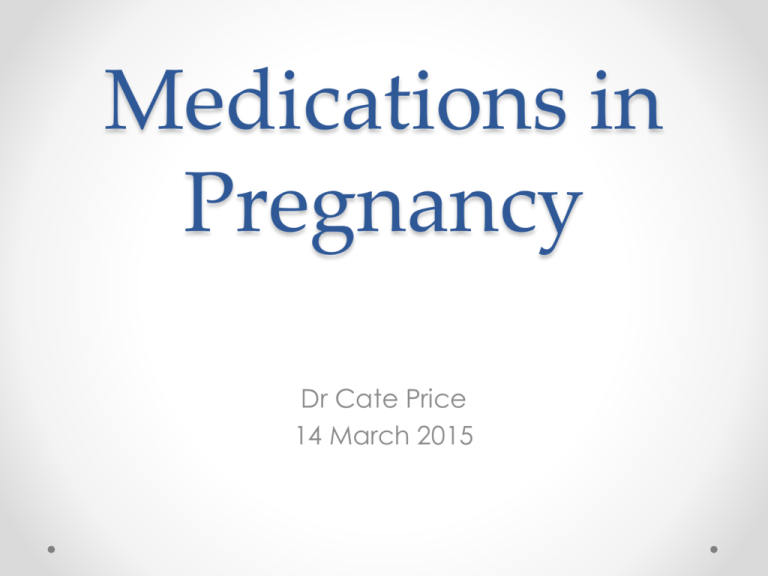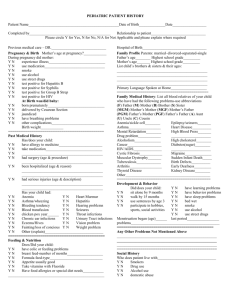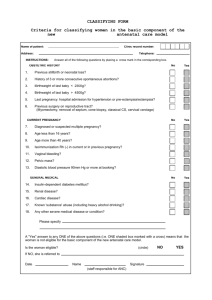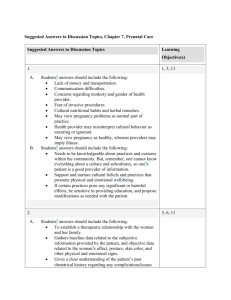Medications in Pregnancy
advertisement

Medications in Pregnancy Dr Cate Price 14 March 2015 Dr Cate Price • GP – Flagstaff Hill Medical Centre • Medical Advisor – Obstetric shared care • Medical Educator – Sturt Fleurieu • VMO – WCH antenatal OPD Learning Objectives • To have an understanding of safety categories for medications in pregnancy • To know when and where to seek advice regarding safety of medications in pregnancy • To learn examples of some “drugs of choice” for common conditions during pregnancy Medications in Pregnancy • General perception that any drug exposures during pregnancy pose a potential risk to the fetus • An Australian study showed that about 96% of women use some form of prescribed or non prescribed medication during pregnancy Teratogens • Teratogens are environmental agents introduced during pregnancy that interfere with development such that they induce or increase the incidence of a congenital (structural) malformation. • Drugs • Infections – Rubella, CMV • Chemicals – Mercury • Radiation • Behavioural teratogens – Alcohol, Valproic acid • Behavioural and Structural – Rubella, Isotretinion Teratogens • Drugs to be avoided during pregnancy • Isotretinoin – craniofacial, ear, cardiovascular and limb defects as well as structural CNS anomalies and neurodevelopmental problems • Valproic acid – fetal valproate syndrome –facial dysmorphism and malformations including neural tube defects, cleft palate and cardiac anomalies as well as neurodevelopmental problems, can occur in > 10% of exposed infants • Warfarin – use between 6-12 weeks –nasal hypoplasia and stippled epiphyses. Use in later pregnancy – fetal CNS haemorrhage Timing of exposure • “All or none period” – first two weeks after conception or 2-4 weeks amenorrhoea from LMP • Generally believed that exposures during this time do not cause malformations • The conceptus is a mass of dividing stem cells with minimal contact with the maternal circulation and which have not yet differentiated into organs Timing of exposure • Embryonic period • • • • 4-11 weeks amenorrhoea most critical period of development structural defects – NTD, cardiac, orofacial (Thalidomide caused limb defects after exposure tween 20-35 days post conception) Timing of exposure • Fetal period • Exposure does not cause malformations • May cause disruption of normally formed organs • (NSAIDs, ACEI – impair fetal renal function – decrease fetal renal production and amniotic fluid volume – fetal joint contractures and pulmonary hypoplasia as a result of oligohydramnios) Australian Categorisation system for prescribing drugs in Pregnancy • https://www.tg.org.au/etg_demo/desktop/tgc/plg/ 5a57ea5.htm#categorya Categories • Incorrectly imply gradations of risk – B3 is not necessarily safer than C • Do not take into account different stages of pregnancy • Often assigned on the basis of animal studies • Assigned before release of drugs and often do not change despite new evidence Information sources • Women’s and Children’s Hospital Drug Information in Pregnancy and Breastfeeding • 8161 7222 • http://www.mothertobaby.org/otis-fact-sheetss13037 Asthma in Pregnancy • Ms C, age 36, is currently 9 weeks pregnant • She has asthma for which she uses • Fluticosone - Salmeterol 1 puff bd • Salbutamol prn • How would you advise her about her medications? Asthma in Pregnancy • When her pregnancy was confirmed (at 5 weeks) her GP advised her to cease the seretide and to use ventolin as needed. • Do you agree with this advice? Asthma in Pregnancy • At 6 weeks pregnant she had an URTI and needed to use her salbutamol several times a day • She saw another GP who advised her she could use a preventer, but to use Budesonide rather than Fluticosone as this was a category A rather than a B3 • Is this reasonable advice? Asthma in Pregnancy • She feels her asthma is better controlled with the Seretide than the Budesonide and she is still needing to use her salbutamol several times a day. • How do you advise her? Asthma in Pregnancy • Discussion points • The most common potentially serious medical problem that can affect pregnant women • 1/3 can expect a worsening of their symptoms • Less likelihood of severe asthma during pregnancy if the condition is well controlled when she conceives • All women who are are pregnant or planning a pregnancy should be advised of the importance of continuing to use the asthma medication that best controls their asthma Asthma in Pregnancy • Discussion points • Most asthma medications are inhaled – only small amounts of the drug enter the blood – cross the placenta • It is far better to treat asthma aggressively with inhaled preventers to avoid the need for oral corticosteroids Asthma in Pregnancy • She is happy to resume Seretide. • Later that afternoon, she rings and is worried as she has read the CMI leaflet in the medication box and it says to avoid this medication in pregnancy. • How do you advise her? Hypertension in Pregnancy • Ms P age 40 comes to you for pre natal counselling • She was diagnosed with Hypertension 5 years ago and her BP is well controlled on Perindopril 5 mgs • What do you advise her about her medication? Hypertension in pregnancy • You seem to remember that ACE inhibitors are contraindicated during pregnancy. • Where would you get accurate, up to date advice? Hypertension in Pregnancy Some commonly prescribed anti hypertensive drugs are contraindicated or best avoided before conception and during pregnancy None have been shown to be teratogenic. ACE inhibitors Angiotensin receptor blockers Diuretics Beta blockers Ca channel antagonists Hypertension in Pregnancy • ACE inhibitors are not recommended in the second and third trimesters of pregnancy • Methyldpoa is the drug of choice Herbal Medication in Pregnancy • Mary is pregnant with her first child. • She is currently 30 weeks pregnant and you have seen her for shared care • The pregnancy has been uneventful • She asks you about raspberry leaf tea as she has heard about it on Mumsnet • What do you know about Raspberry Leaf Tea? Herbal Medication in Pregnancy • Herbalists have long believed that raspberry leaf tea taken regularly during pregnancy can prevent complications and make delivery easier. • Only one clinical study – no benefit • Did not significantly shorten labour, reduce pain or prevent complications Herbal Medications • Medications considered safe • • • • • • • Ginger Echinacea Evening Primrose oil Valerian Magnesium Fish oil Herbal teas Herbal Medications • Medications to be avoided – usually because of theoretical uterine stimulation • • • • • • • • • • • • Aloe vera Dong quai/Angelica Feverfew Arbor vitae Goldenseal Black and Blue Cohosh Passionflower Cascara Pennyroyal Comfrey Pokeweed Slippery Elm Drugs of Choice Condition Drug of Choice Other suitable agents Comment Allergic Rhinitis Topical agents Phenylephrine Na cromoglycate Oxymetazoline Corticosteroids Xylometazoline Systemic antihistamines Pheniramine Loratidine Cetrizine Topical decongestants – theoretical concerns about vasoconstriction Cough/Cold Pseudoephedrine/P henylephrine available in many cough/cold preparations theoretical concerns about vasoconstriction Paracetamol Throat lozenges Codeine Dextromethorphan Pseudoephedrine Phenyephrine Drugs of Choice Constipation Dietary fibre Lactulose Docusate Bisacodyl Psyllium Paraffin Lactose should be avoided in people with lactose intolerance and Diabetes Depression SSRIs SNRIs TCA Mirtazepine Conflicting data regarding possible increase risk of cardiovascular defects in babies exposed to SSRIs. Reassuring long term neurodevelopmental data Diarrhoea Codeine Loperamide Fever Paracetamol NSAIDs NSAIDs should be avoided in the third trimester because of fetal renal side effects and the potential to cause premature closure of the ductus arteriosus Drugs of Choice Nausea and Ginger vomiting of Vitamin B6 pregnancy Doxylamine Metoclopramide Ondansetron Heartburn/ Reflux Antacids Simethecone H2 antagonists Omeprazole and other PPIs Recent studies have shown that omeprazole is not associated with any increase risk of birth defects or other adverse pregnancy outcomes Pain Paracetamol Codeine Morphine Pethidine NSAIDs NSAIDs should be avoided in the third trimester because of fetal renal side effects and the potential to cause premature closure of the ductus arteriosus



